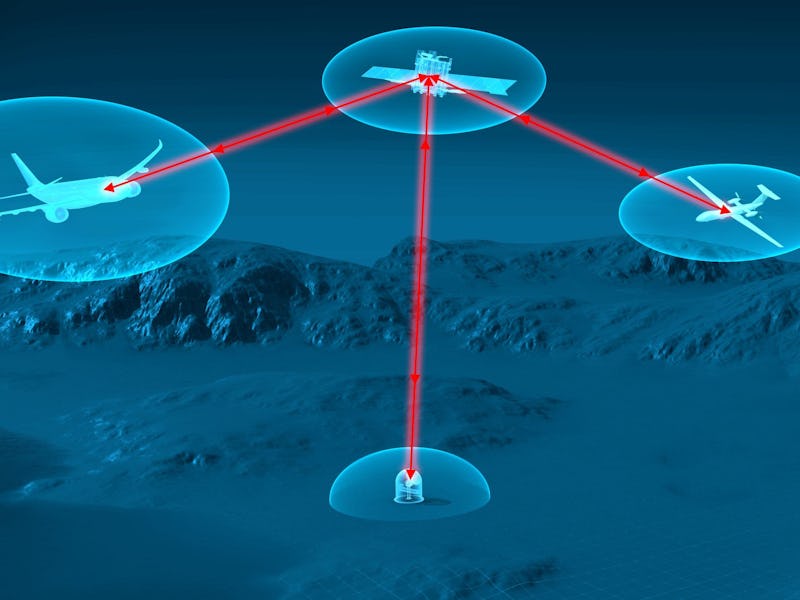Airbus will use lasers to improve the worst part of flying
If The Graduate were made today, they’d say there’s a great future in lasers. Airbus seems to think so.

Airbus wants to take a page out of the Dr. Evil playbook and improve in-flight wifi with frickin’ laser beams.
OK, so it’s not quite to make your in-flight Fortnite dreams come true. Instead, the French aerospace company wants to use lasers to connect aircraft to geostationary satellites thousands of miles away to improve in-flight connectivity in a secure, reliable way.
The project is called UltraAir. Airbus hopes it will enable aircraft and satellites to communicate without using the radio frequency (RF) bands currently used by satellite systems. Those RF bands are becoming increasingly crowded. Instead, UltraAir will use data-encoded lasers to create faster transmission rates that have a direct line to the far-away sats.
The lasers will have the added advantage of being extremely resistant to interference and detection, which is of particular importance to the military and defense contractors. A laser has a much tighter beam than even the most directed RF products, making it nearly impossible for an adversary to intercept your data stream.
“As satellite services demand is growing, the traditional sat-com radio-frequency bands are experiencing bottlenecks,” the company announced this month.
It might not make much of a difference if anyone knows you’re streaming Bridgerton on your next flight, but Air Force One has very different security needs that UltraAir could someday fulfill. As a bonus, Airbus says, the in-flight laser terminal can be smaller and lighter than a current sat-com system, which improves fuel efficiency and reduces emissions.
The planes will communicate with the OneSat satellites to deliver fast and well encrypted information up to geostationary orbit and back.
UltraAir would also improve wifi speeds. Though the product is aimed primarily at well-heeled defense customers who really want faster and secure data on the go, Airbus believes it could eventually be installed on commercial aircraft as well.
So how fast could this wifi be? Airbus believes that “several gigabits-per-second” data speeds are possible “while providing anti-jamming and low probability of interception” benefits. So what does that mean for a potential future laser-equipped commercial flight? The fastest satellite-based systems in current aircraft, like those with Gogo’s 2Ku system installed, max out at around 70 Mbps to the plane (shared amongst all passengers) and Gogo charges $7 per hour or $19 for a day pass for the privilege (though wifi charges on airlines vary wildly).
The new laser-based Airbus system, if what’s being promised pans out, would be some 30 to 40 times as fast as the current 2Ku system — and two to three times as fast as the quickest residential internet connections that you might get from Comcast or Google Fiber. Those usually cost between $50 and $150 per month.
What’s next — The project is expected to undergo viability testing by the end of 2021 in lab conditions, with ground tests starting next year in Tenerife (the largest of the Canary Islands) between a ground station and a laser terminal already in orbit aboard an Alphasat satellite. The team hopes to have a demonstrator installed on an aircraft for initial flight testing by mid-2022.
The UltraAir program is a partnership between Airbus, the Netherlands Organization for Applied Scientific Research, and the Netherlands Space Office.
Of course, this is hardly the only new in-flight satellite connectivity being worked on. SpaceX is designing a plane-mounted version of Starlink for the US Air Force, with the company requesting permission from the FCC to begin in-flight testing on aircraft as well as moving vehicles on the ground.
By the way, if you liked this article, you’ll love my weekly car review newsletter PRNDL. Click here to subscribe for free on Substack. I’ll even answer your new car questions!
This article was originally published on